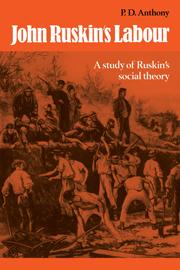Summary
Ruskin's fall has been grandiose and complete. His influence once rested upon the respect paid him by the most powerful and influential. Tolstoy, Morris, Shaw, Tawney, Proust, Gandhi and a host of figures of more ordinary standing demonstrated or acknowledged their debt. For socialists, once, Ruskin, had become a part of the sacred writing, not always understood but to be regarded with reverence. Quentin Bell reported that when the British Labour Party was established in 1906, ‘it was found that the book which had exerted the greatest influence on the members of the young party was “Unto This Last”’. He added that a ‘veteran of the movement’ had doubted whether any of them had read it although they might have felt that they should have done. Bell said that Ruskin ‘could be accommodated in the Pantheon of British Socialism. Whether he still has a place there may well be doubted.’ Even that element of doubt has by now been removed.
The case for re-establishing the importance of Ruskin's social criticism faces formidable difficulties. It is out of touch with the times. Contemporary society, if it is not wedded to the capitalist economics of industrial growth, is concerned with centralised planning to achieve the same ends, or with egalitarianism. Ruskin stands against all these objectives. In terms of current influence, Ruskin is dead. Let us begin the attempt at resuscitation (for that is what it will amount to, rather than the more detached essay in appraisal or assessment) in the least ambitious manner.
- Type
- Chapter
- Information
- John Ruskin's LabourA Study of Ruskin's Social Theory, pp. 189 - 211Publisher: Cambridge University PressPrint publication year: 1984



